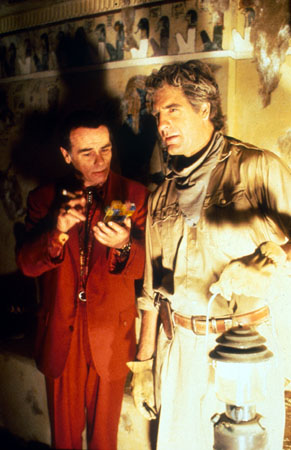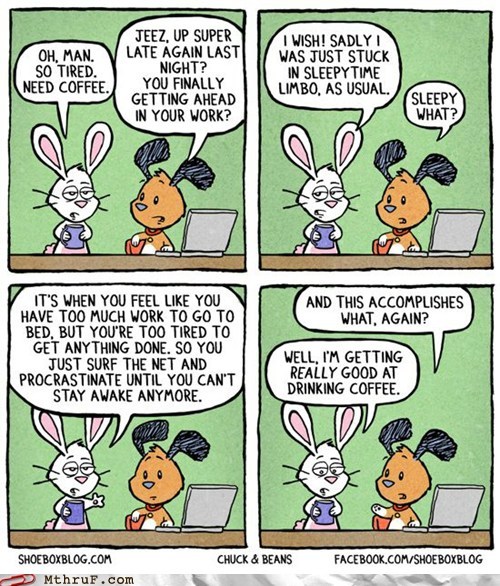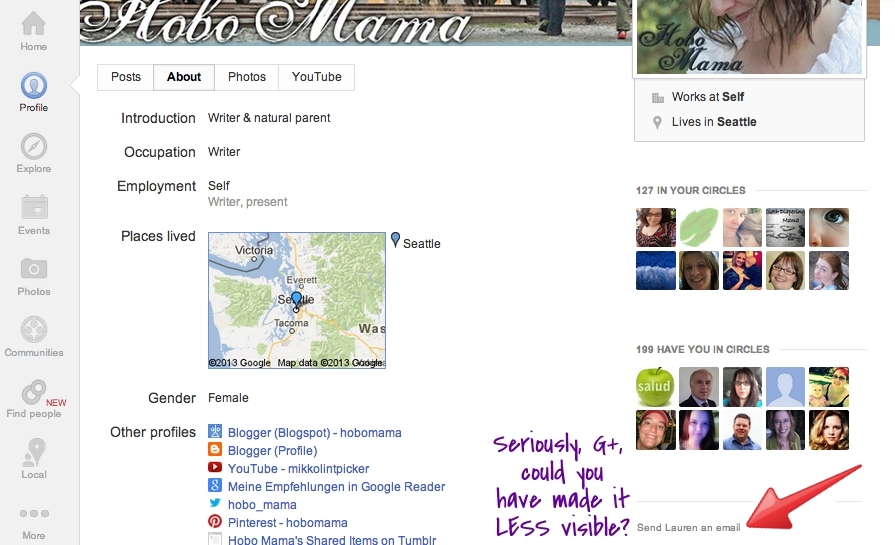 |
| Will a mummy prevail over Sam and Al? |
There's a construct in the world of television fiction that
Sam and I have dubbed "The Mummy Episode." I recommend you start looking out for it from now on — you'll quickly start to recognize its ubiquitous presence.
We named it after watching two episodes of disparate shows that both featured mummies and the
same peculiar twist at the end. One was
Quantum Leap (
"The Curse of Ptah-Hotep"), and one I cannot remember. I thought it was
Young Indiana Jones. (Did I mention we're nerds? But you figured that out anyway, right?) But I
rewatched that one on YouTube, and it's not it.
Regardless: In each, there's a
rumored mummy curse that's said to be causing all sorts of mayhem. The main character (Sam Beckett the scientist in
Quantum Leap) is level-headed and rational and insists there's no such thing as mummies that rise from the dead and that therefore the destruction must be the result of a very human person's mischief. The secondary characters (such as Al the emotional hologram) insist that mummies coming back to life are very, very real. But over the course of the episode (spoiler alert!), they deduce that, indeed, human hands were behind the chaos, and
rationality wins the day.
Or does it?
Because both episodes close with a tantalizing hint that …
NO! MUMMIES DO COME BACK FROM THE DEAD! THEY DO HAUNT THE LIVING! AAAAA!!!
For instance, the
Quantum Leap episode (again: spoiler, if you care, since the show's, like, over 20 years in the past) ends with a glimpse of a wrapped hand reaching forward. Oo, spooooky!
Only it's so DUMB. Why spend the whole episode with the main character convincing us that logic will light the way, only to
invalidate his whole message in one brief coda? Are we to believe that the villains they apprehended are not the bad guys after all? Or did they in fact cause the mayhem but did so only by orders of the evil mummy overlords and The Curse?
(Wait — that's a menstrual cycle, right? Well, same diff.)
We have since seen multiple other examples of this sort of Mummy Episode.
Quantum Leap had extra Mummy Episodes within its run that dealt with other phenomena, like the vampire (
"Blood Moon") who's really just a weirdo …
until Sam can't look in a mirror to see his reflection … woooo!
Many Mummy Episodes deal with
otherworldly messages and psychics who are disproved … or are they? Like
The Mentalist, whose whole premise is that psychics are just tricksters but that keeps muddying the waters with appearances from
another is-she-isn't-she psychic. I was just watching the middling show
Body of Proof (I could say a lot about the writing and acting there, but I wanted something detective-y to watch and it was free on Hulu), and it was the same thing (spoiler alert for reals): The daughters of one family are supposedly possessed by Satan, until it's revealed they've been drugged … but then
one of them has these messages from beyond the grave for the main, rational doctor character. Huh-wha?.
Psychics and spiritually possessed characters being generally discredited but who have one zinger of a line per show are such a staple of fiction that sometimes I think we forget that it
is just fiction. Only a TV show can have such a convincing moment of beyond-the-grave communication.
The same sort of thing has happened in
Bones and
House, and you know from the one-word series names (just joking) that these people are über-logical. In fact,
Bones makes a career of Mummy Episodes, though you'd expect that from such a nonsensical show. (I even like
Bones, but it's so far removed from the science-minded
Kathy Reichs novels it's based on that it's astounding.)
Other variations on the Mummy Episode include
aliens from outer space, mythological creatures, angels, ghosts, visitations from the (non-mummified) dead, or mysterious objects reappearing where they shouldn't be. At least one character insists such things are not logical and proves the point against the more gullible characters by solving the mystery — until the ending provides a hint that, no, the seemingly fictional element really was real.
And as for the purest form, it's
shocking how many Mummy Episodes contain mummies. It's probably around 30%. Can you imagine if 30% of episodes that "jumped the shark" involved actual shark jumping?
The problem with Mummy Episodes is that
the infuriating ending negates everything that's gone before. It's like if each
Scooby Doo episode ended with revealing that the ghosts were just bad guys in masks … and then another ghost floated by and everyone ran for cover into the Mystery Machine. The whole
point of mystery shows is that
there's a logical explanation for what's happening that can be deduced through observation and right thinking, and that the main character is the right person for that job. To have that
undermined by a glimpse of something spooooky at the end makes all the hard work meaningless.
Agatha Christie gave Hercule Poirot a
Mummy Episode of sorts … only hers ended the right way:
with bad guys captured, superstition unmasked, and mummy curses disproved. The very goofily enjoyable
Psych even had an
actual marauding mummy in an episode who was revealed to be a real-life mortal murderer, end of story. So not everybody falls under the curse of the Mummy Episode!
Look out for Mummy Episodes now and tell me when you see one!
{Added October 22, 2013:} Castle
's Episode 110 from Season 6, "Time Will Tell," deals with oh-my-gosh-are-they-really-real time travelers.




 1
1


 If you've connected your Google presence to your Google+ profile, as is now the default, there's no standard way for people outside your circles to contact you if they want to drop you a line. There's a feature on the old Blogger profiles to make your email address visible, but if you've upgraded to G+, that profile is history (or soon will be, as I imagine they'll be phased out shortly).
If you've connected your Google presence to your Google+ profile, as is now the default, there's no standard way for people outside your circles to contact you if they want to drop you a line. There's a feature on the old Blogger profiles to make your email address visible, but if you've upgraded to G+, that profile is history (or soon will be, as I imagine they'll be phased out shortly). 



